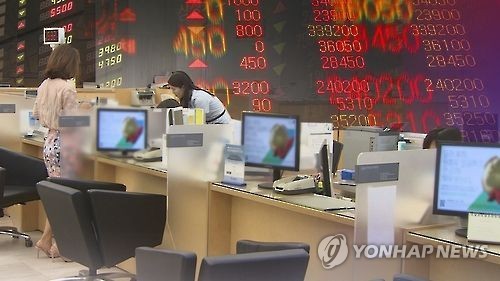South Korea's derivatives market shows no signs of bouncing back, data showed Thursday, amid criticism that strict regulations continue to damp investors' appetite.
The country once boasted the world's largest derivatives market, but it has suffered a sharp decline in trading over the past several years.
 |
An image of derivatives trading in a file photo provided by Yonhap News TV (Yonhap) |
The daily average trading volume of stock index futures totaled 17 trillion won ($14.4 billion) last year, down 62.5 percent from 45.4 trillion won in 2011, according to the Korea Exchange and the Bank of Korea.
After peaking in 2011, the amount kept falling to 32 trillion won in 2012, 26 trillion won in 2013, 19.9 trillion won in 2014 and 19.8 trillion won in 2015.
The average trading volume of stock index options also shrank 70 percent to 512 billion won in 2016, compared with that of 2011.
It's a sea change from South Korea's stature in the global derivatives trade several years ago. It ranked No. 1 by trading volume between 2001 and 2011, spurred by heavy retail investor activity in equity derivatives.
But the country has lost investors to neighboring markets, such as China and Japan, since the financial authorities tightened rules in 2011 in a bid to curb highly speculative activities.
The local regulators' decision was affected by the so-called "Deutsche Options Shock."
Germany-based Deutsche Bank was found to have manipulated South Korea's stock market on Nov. 11, 2010, through massive selling of stock index options.
The following year, a South Korean man who invested in "put options" was arrested for masterminding explosions at public transportation hubs in Seoul in an attempt to gain stock profits.
Seeking to prevent such crimes, regulators announced stricter market rules, including higher minimum trading units of index-linked options and more collateral for foreign exchange margin trading.
"The government seems to have reacted sensitively to the incidents amid concern about highly speculative investment," a market watcher said. "It's now difficult to revive the local derivatives market, which has been hurt too severely." KRX officials admitted to the difficulty of turning around the trend soon.
"Efforts are necessary, I think, to improve public awareness on the derivatives market via good education and transform it into a sound market to produce returns higher than the minimum bank interest rates," a KRX official said. (Yonhap)







![[Today’s K-pop] Blackpink’s Jennie, Lisa invited to Coachella as solo acts](http://res.heraldm.com/phpwas/restmb_idxmake.php?idx=644&simg=/content/image/2024/11/21/20241121050099_0.jpg)
